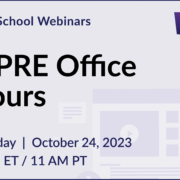Attorney-Client Privilege vs. Duty of Confidentiality On MPRE
Attorney-Client Privilege vs. Duty of Confidentiality On The MPRE
One of the things you should definitely know for the MPRE is the difference between Attorney-Client Privilege and the Duty of Confidentiality. In this post, we explain the difference!
Attorney-Client Privilege vs. Duty of Confidentiality On The MPRE
Attorney-Client Privilege
If you review the Model Rules of Professional Conduct, you actually won’t find a rule for attorney-client privilege. The attorney-client privilege is an evidentiary rule that prevents a court from using its powers to compel the revelation of confidential communications between an attorney and a client.
Important takeaways:
- It is a rule of evidence that applies in the court (or litigation) setting
- It only applies to communications (i.e., conversations) between the attorney and the client
The privilege only extends to confidential communications. That means, if someone else is present when the attorney and the client are having a conversation, it is generally not confidential and, therefore, not covered by the privilege! The client holds the privilege (and, therefore, only the client can waive it) and the privilege lasts forever – even beyond the termination of the attorney-client relationship, or the death of the client!
Duty of Confidentiality
The duty of confidentiality is covered by Model Rule of Professional Conduct 1.6. Pursuant to this rule, a lawyer shall not reveal confidential information relating to the representation of the client unless the client gives informed consent, the disclosure is impliedly authorized in order to carry out the representation, or the disclosure is permitted by an exception to the duty of confidentiality.
Important takeaways:
- This duty applies to ALL information the attorney has about the client. It is not limited to communications between the attorney and the client.
- It applies in ALL scenarios, not just the court or litigation setting.
Like the attorney-client privilege, the duty of confidentiality also lasts forever, surviving both the termination of the attorney-client relationship and the death of the client!
Which is broader: the duty of confidentiality or the attorney-client privilege?
The duty of confidentiality is much broader than the attorney-client privilege. As explained above, the duty of confidentiality applies to ALL information the attorney has about the client; it is not limited to conversations between the attorney and the client. Furthermore, the duty of confidentiality applies to all settings, not just settings in which the rules of evidence apply.
Here is a diagram depicting the relationship between the attorney-client privilege and the duty of confidentiality:

In other words, everything that is covered by the attorney-client privilege is also covered by the duty of confidentiality!
Exceptions
In addition to being familiar with the rules, it is also important to understand the exceptions. There are four exceptions to attorney-client privilege and six exceptions to the duty of confidentiality. Two of the exceptions apply to both the attorney-client privilege and the duty of confidentiality!
Exceptions to the attorney-client privilege:
- The privilege does not apply if the client seeks the attorney’s services to engage in or assist a future crime or fraud. (NOTE: this is also an exception to the duty of confidentiality.)
- The privilege does not apply to a communication that is relevant to an issue of breach, by either the attorney or the client, of duties arising out of the attorney-client relationship. (NOTE: this is also an exception to the duty of confidentiality.)
- The privilege does not apply in civil litigation between two persons who were formerly joint clients of the attorney.
- The privilege does not apply when the attorney can furnish evidence about the competency or intention of a client who gives or attempts to give property by will or during life.
Exceptions to the duty of confidentiality:
- The attorney may reveal otherwise confidential information to prevent reasonably certain death or substantial bodily harm.
- The attorney may reveal otherwise confidential information to prevent the client from committing a crime or fraud that is reasonably certain to result in substantial injury to the financial interests or property of another and in furtherance of which the client has used or is using the lawyer’s services. (NOTE: this is also an exception to the attorney-client privilege.)
- The attorney may reveal otherwise confidential information to secure legal advice about the lawyer’s compliance with the MRPC.
- The attorney may reveal otherwise confidential information to establish a claim or defense on behalf of the lawyer in a controversy between the lawyer and the client, to establish a defense to a criminal charge or civil claim against the lawyer based upon conduct in which the client was involved, or to respond to allegations in any proceeding concerning the lawyer’s representation of the client. (NOTE: this is also an exception to the attorney-client privilege.)
- The attorney may reveal otherwise confidential information to comply with a law or court order.
- The attorney may reveal otherwise confidential information to detect and resolve conflicts of interest arising from the lawyer’s change of employment or from changes in the composition or ownership of a firm, but only if the revealed information would not compromise the attorney-client privilege or otherwise prejudice the client.
If you are looking for a video explanation of this, check out our free MPRE course! It comes with a free outline, free practice questions, and free instruction! You can enroll here!
Looking to Ace the MPRE?
- Enroll in our 5-star rated free MPRE Course, complete with expert guidance, an exclusive outline, practice questions, and a one-sheet.
- Tackle the Real MPRE questions — the gold standard for test preparation.
- Elevate your preparation with personalized MPRE private tutoring, featuring a tailored study plan and dedicated MPRE outline.
- Dive into our assortment of complimentary top-notch MPRE resources for your success.







Leave a Reply
Want to join the discussion?Feel free to contribute!